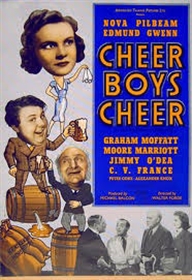Cheer Boys Cheer: Difference between revisions
Clarityfiend (talk | contribs) expanded a bit; minor correction |
|||
| Line 42: | Line 42: | ||
* [[Moore Marriott]] as Geordie |
* [[Moore Marriott]] as Geordie |
||
* [[Graham Moffatt]] as Albert Baldwin |
* [[Graham Moffatt]] as Albert Baldwin |
||
* [[C.V. France]] as Tom Greenleaf |
* [[C. V. France]] as Tom Greenleaf |
||
* [[Peter Coke]] as John Ironside |
* [[Peter Coke]] as John Ironside |
||
* [[Alexander Knox]] as Saunders |
* [[Alexander Knox]] as Saunders |
||
Revision as of 01:32, 9 June 2022
| Cheer Boys Cheer | |
|---|---|
 | |
| Directed by | Walter Forde |
| Written by | Roger MacDougall Allan MacKinnon |
| Story by | Donald Bull Ian Dalrymple |
| Produced by | Michael Balcon |
| Starring | Nova Pilbeam Edmund Gwenn Jimmy O'Dea Graham Moffatt Moore Marriott Peter Coke |
| Cinematography | Ronald Neame |
| Edited by | Ray Pitt |
| Music by | Van Phillips Alfred Ralston |
Production company | |
| Distributed by | Associated British Film Distributors |
Release date |
|
Running time | 84 minutes |
| Country | United Kingdom |
| Language | English |
Cheer Boys Cheer is a 1939 British comedy film directed by Walter Forde and starring Nova Pilbeam, Edmund Gwenn, Jimmy O'Dea, Graham Moffatt, Moore Marriott and Peter Coke.[1]
Plot
Edward Ironside, the head of Ironside Brewery Ltd., a modern company, tells his board of directors of his plans for expansion. Naseby, a new board member, objects, saying they should turn their efforts to improving the taste of their beer instead, but Ironside has the unquestioned support of the rest of the board. He targets an area of London served by Thomas Greenleaf and Sons, a smaller, more gently run brewery which is about to celebrate its 150th anniversary. He has purchased as many shares of the firm as possible, but Greenleaf still holds 55%. Afterward, it becomes apparent that his ruthless son John, the Director of Publicity, is really the one in charge.
Cast
- Nova Pilbeam as Margaret Greenleaf
- Edmund Gwenn as Edward Ironside
- Jimmy O'Dea as Matt Boyle
- Moore Marriott as Geordie
- Graham Moffatt as Albert Baldwin
- C. V. France as Tom Greenleaf
- Peter Coke as John Ironside
- Alexander Knox as Saunders
- Ivor Barnard as Naseby
- Walter Forde as Pianist at Wedding
- James Knight as Ironside's Chauffeur
- Hay Plumb as Greenleaf Employee
- Charles Rolfe as Ironside Thug
- Harry Terry as Brewery Worker
- Jean Webster-Brough as Maggie
Production
The film was made by Ealing Studios, roughly a year after Michael Balcon had taken over from Basil Dean as head of production. It was released shortly before the outbreak of the Second World War, the last Ealing film to be released in peacetime.
Reception
The film's representation of the differing management styles of the Ironside and Greenleaf companies has traditionally been seen as an analogy for Nazi Germany and the United Kingdom in the lead-up to the outbreak of war.[2]
The film has also come to be seen as a precursor of the later "Ealing Comedies",[2] sharing a similar theme of big versus small, traditional versus modern with the later films which began with Hue and Cry in 1947.[3][4]
References
- ^ "Cheer Boys Cheer (1939)".
- ^ a b Perry p.42-43
- ^ "BFI Screenonline: Cheer Boys Cheer (1939)". www.screenonline.org.uk.
- ^ "BFI Screenonline: Hue and Cry (1947)". www.screenonline.org.uk.
Bibliography
- Perry, George. Forever Ealing: A Celebration of the Great British Film Studio. Pavilion, 1981.
External links
- Cheer Boys Cheer at IMDb
- Cheer Boys Cheer at the BFI's Screenonline
